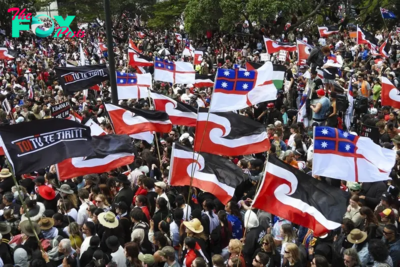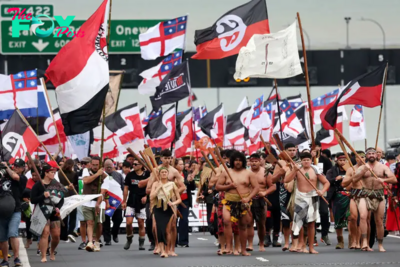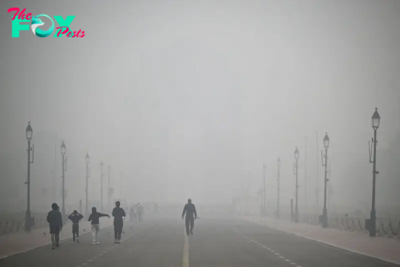World News
A Night to Remember: Watching the U.K. Election Unfold From a London Pub
The floor is sticky. The room is hot and stuffy. Bodies swim past each other, spilling pints along the way. The smell of stale ale floats in the air. The bartenders at this North London pub look bored, while patrons buzz with anticipation, eyes glued to the giant projection screen airing a live BBC broadcast. It’s the evening of July 4 and the United Kingdom’s general election is drawing to a close. In a matter of hours, the country will have a new Prime Minister after 14 years of Conservative Party rule. For now, however, those gathered inside this establishment retain their composure, steadily counting the hours until polls close at 10 p.m.
For most Britons, pubs are more than just a place to drink beer. Throughout History, they have been the heart of community interaction. The pub provides a colorful haven when the world—and the weather—seems grey. It’s where politicians have negotiated deals, writers have penned novels, and ordinary punters engage in hearty debate about the country’s state of affairs. “Pubs lie at the center of political activity in almost every community and this general election has been no exception,” says pub owner and bartender Merlin Griffiths, who served drinks on the British reality TV show, First Dates.
Read More: Why Rishi Sunak Called an Early Election—and Rained on His Own Parade
This pub, The Lexington, is housed in an 1875 building and situated between Kings Cross—a once-seedy railyard that has since become a tech hub, housing the London offices of Google and Meta—and Islington, a gentrified borough closely associated with the Labour Party and champagne socialism. Former Labour Prime Minister Tony Blair lived in the area and former Labour Party leader Jeremy Corbyn, now a leftist independent, has held on to power as a Member of Parliament (MP) in the Islington North constituency since 1983. On an ordinary night, The Lexington transforms into a music venue and nightclub. Tonight, political spectators began arriving at 3 p.m. to revel in a morbid curiosity about British Politics. There are TV crews from Denmark and Japan capturing the activity. “We’ve got 400 people over both floors of this pub watching the election, which is kind of funny when you think about it,” says Matthew Hall, the owner.
Although the election isn’t yet over, most early polls have predicted a landslide win for the opposition Labour Party and its leader, Keir Starmer, who leads by 18 points on average over Prime Minister Rishi Sunak from the Conservative Party. The patrons inside seem to be left-leaning, a trend that more broadly reflects the political leanings of most London residents: they cheer loudly when a graph on the screen predicts a Conservative loss at around 8 p.m. (They also cheer when Larry the Cat, a domestic tabby that has served as Chief Mouser to 10 Downing Street since 2011, makes an appearance on TV.)
In a corner upstairs, a 26-year-old economist named Rory Fennessey is squatting on the floor with a set of colored pencils and a hex map of the U.K., ready to fill all 650 parliamentary constituencies when the results start trickling in. “It’s just a fun little thing to do,” he says. “Maybe I’ll frame it after the election.”
Fennessey believes the first-past-the-post system used in U.K. general elections—where the candidate with the most votes in each constituency becomes the MP, winning seats for their party regardless of whether that party gets a majority of the overall votes cast—is a “really, really bad electoral system.” But it makes analysis “really, really interesting,” he says, “because depending on which constituencies swing which way, you can really change the outcome of the election.”
Read more: Britain Is Facing Its Most Seismic Election in Decades. So Why Does It Feel So Boring?
Still, he found this election pretty boring. “The Tories are a dead brand, and Labour aren’t exactly very exciting either,” he says. But even then it’s a big moment for the country. “We’re on the cusp of history since we’re probably going to get the biggest [Labour] majority since 1997,” he says, before returning to his map.
A sentiment widely echoed in this pub is that this election is more about a changing of the guard than a win for the Labour Party. Downstairs, 29-year-old Claudia Hyde has squeezed in under the screen with a group of friends. A barrister in London who voted by a postal ballot, Hyde says she’s found the last decade of U.K. Politics to be “disheartening.”
She says people of her generation have been particularly hit by stagnant wages, the rising cost of living, and unaffordable housing because of the economic devastation caused by austerity, a set of policies introduced by consecutive Conservative-led governments to slash the cost of welfare. “The number of people I know who've given up on the prospect of having secure, high-quality housing that they don't pay the majority of their wage for is very depressing,” she says.
“I'm not necessarily hugely enthused about the prospect of Keir Starmer in particular, but I’m excited by the prospect of a change of government,” Hyde says.
Read more: How 14 Years of Conservative Rule in the U.K. Pushed Young People Into Poverty
Others are a little more optimistic about the Labour Party. Akay Okcun, 38, who lives in Southeast London, says he has always valued the party’s policies more. “I have an autistic brother who hasn’t been able to get a job and who is always going to be dependent on my parents for support,” he explains. “My family currently lives in a Conservative area, where support for social services has really been slashed.”
“If Labour wins,” he continues, “I hope they’ll commit to improving the NHS [National Health Service], and make better investment in councils so that people get more support.”
Similarly, 43-year-old Joe, who asked to not disclose his full name because he works in the civil service, is impressed with Starmer’s leadership in turning things around since 2019, when Labour suffered a second election defeat under Corbyn.
“I think that's quite underappreciated by a lot of people,” he says. “They think he's been lucky because the Conservative Party is falling apart, but part of the reason they fell apart is because of Starmer being comPetent and managerial.”
Read more: The Man Who Wants to Fix Britain
As the night goes on and more pints are guzzled, some spectators start to feel cheeky. 35-year-old Harry Young says a friend offered to buy him drinks all night if he cheers for the Tories. “That’s not really in my vocabulary, but I’ve been shouting ‘rah rah rah’ whenever they come on the screen, which people don’t like,” he smirks, holding up his beer. “I’m not a partisan political person, but what do the Conservatives have to show for themselves?”
Young, who works in tech, says he’s ready for some stability in the country. “I just want people to feel good about themselves and have opportunities and a more thriving society would be better for everyone,” he continues.
When the clock is about to strike at 10 p.m., a loud countdown begins as onlookers anticipate the results of a trusted exit poll—the first reliable indication of how the result will go after voting ends. The poll, which was conducted by polling company Ipsos for the country’s leading broadcasters, surveyed 20,000 voters.
As the screen flashes, the exit poll’s results are dramatic: the Labour Party is projected to win a landslide victory with 410 seats in the new Parliament—a majority of 170, just short of 179 won under Blair in 1997. The Conservatives will be reduced to 131—their worst performance in modern political History. And in what is perhaps the biggest surprise of all, Reform UK, the anti-immigrant party led by populist Nigel Farage, is projected to win 13 seats.
Read more: Labour Delivered a Decisive Victory in Britain. Now Comes the Hard Part
The room erupts in a loud cheer as drinks fly in the air. Friends hug each other. The atmosphere is drunk and jubilant.
In a different part of London, hundreds are gathered at the Tabernacle, an old church-turned-performance space in Notting Hill, for a live show of Oh God, What Now?, a left-of-center political podcast. The venue falls silent before the exit poll results come through. Then, there’s a roar at the scale of Labour's landslide. Among the youngest in the audience is a girl aged just 14—living in Tory-ruled Britain is all she's ever known. That is, until now.
The next morning, the actual numbers will look a little different from the exit poll’s predictions. Some constituencies will still be counting their votes for hours to come, but the Labour Party will have nonetheless flipped more than 200 seats to secure a majority of 172 seats, with a total of 412 seats. The Conservatives will see their vote share almost halved with just 121 seats. And Reform will secure a more modest five seats.
Rishi Sunak will resign as Prime Minister after meeting the King at Buckingham Palace. "I have heard your anger,” he will tell voters in a final speech on Downing Street. At the Labour reception at the Tate Modern Gallery in central London, Keir Starmer will give his first speech. “Change begins now. And it feels good, I have to be honest,” he will say.
But for now, the spectators linger at the pub a little longer, watching the results trickle in until dawn. “I think for most people here tonight, their team has won,” The Lexington’s owner Hall says, smiling.
With reporting by Yasmeen Serhan/London
-

 World News9h ago
World News9h agoU.S. Charges Indian Billionaire Gautam Adani With Defrauding Investors
-

 World News9h ago
World News9h agoU.S. Vetoes U.N. Resolution Demanding a Cease-Fire in Gaza
-

 World News15h ago
World News15h agoPutin Signs New Doctrine Lowering Nuclear Weapons Threshold in Warning to U.S.
-

 World News15h ago
World News15h agoTens of Thousands Rally at New Zealand’s Parliament in Support of Māori Rights
-

 World News20h ago
World News20h ago45 Hong Kong Activists Receive Prison Sentences in Landmark National Security Case
-

 World News1d ago
World News1d agoAzerbaijan Should Never Have Been COP Host
-

 World News2d ago
World News2d agoWhy New Zealand’s Founding Treaty Is in Focus as Thousands Protest for Māori Rights
-

 World News2d ago
World News2d agoIndia’s Capital Chokes as Air Pollution Levels Hit 50 Times the Safe Limit


















